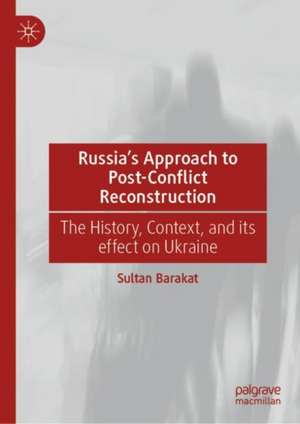Russia's Approach to Post-Conflict Reconstruction: The History, Context, and its effect on Ukraine
Autor Sultan Barakaten Limba Engleză Hardback – 9 dec 2023
Against this backdrop, this book explores the role of Russia in the reconstruction of a range of countries and territories including Crimea, the North Caucasus and Chechnya as well as Syria. Based on the author’s three decades-long experience in research and engagement in post-conflict reconstruction, the book offers a valuable overview of the main lessons learned that will be of relevance to Ukraine. The case selection is not intended to offer an exhaustive account of all the recent or contemporary conflicts in which Russia has involved itself. Rather the cases have been selected to illustrate a range of interventions across different periods and geographical areas, highlighting the spectrum of Russian reconstruction policies and strategies.
Preț: 696.82 lei
Preț vechi: 819.79 lei
-15% Nou
Puncte Express: 1045
Preț estimativ în valută:
133.34€ • 138.94$ • 110.40£
133.34€ • 138.94$ • 110.40£
Carte tipărită la comandă
Livrare economică 03-17 aprilie
Preluare comenzi: 021 569.72.76
Specificații
ISBN-13: 9783031345210
ISBN-10: 3031345215
Pagini: 202
Ilustrații: XIX, 202 p. 3 illus.
Dimensiuni: 148 x 210 mm
Greutate: 0.42 kg
Ediția:1st ed. 2023
Editura: Springer International Publishing
Colecția Palgrave Macmillan
Locul publicării:Cham, Switzerland
ISBN-10: 3031345215
Pagini: 202
Ilustrații: XIX, 202 p. 3 illus.
Dimensiuni: 148 x 210 mm
Greutate: 0.42 kg
Ediția:1st ed. 2023
Editura: Springer International Publishing
Colecția Palgrave Macmillan
Locul publicării:Cham, Switzerland
Cuprins
Chapter One - Setting the Scene.- Chapter Two - Moscow’s response to post-war recovery in the aftermath of WWII.- Chapter Three - Russia’s unique approach as a (re)emerging donor.- Chapter Four - Intervention and reconstruction in the Caucasus: The cases of Chechnya, Abkhazia, and South Ossetia.- Chapter Five - Intervention and reconstruction in Syria.- Chapter Six - Ukraine: The context, the case of Crimea, and Moscow’s commitments to annexed territories.- Chapter Seven - Conclusion.
Notă biografică
Sultan Barakat is Senior Professor in Public Policy at Qatar Foundation’s Hamad Bin Khalifa University, and Honorary Professor at the University of York. His research focuses on the study of war-torn societies and their recovery. Professor Barakat founded the Center for Conflict and Humanitarian Studies at the Doha Institute for Graduate Studies and directed it between 2016 and 2022. Previously he served as Director of Research at the Brookings Institution’s center in Doha. At the University of York, he founded and led the Post-war Reconstruction and Development Unit between 1993 and 2019.
Textul de pe ultima copertă
Sultan Barakat is Senior Professor in Public Policy at Qatar Foundation’s Hamad Bin Khalifa University, and Honorary Professor at the University of York. His research focuses on the study of war-torn societies and their recovery. Professor Barakat founded the Center for Conflict and Humanitarian Studies at the Doha Institute for Graduate Studies and directed it between 2016 and 2022. Previously he served as Director of Research at the Brookings Institution’s center in Doha. At the University of York, he founded and led the Post-war Reconstruction and Development Unit between 1993 and 2019.
Soon after Russia invaded Ukraine in February 2022, Vladimir Putin expressed Russia's commitment for the reconstruction of the war-devasted Eastern regions of Ukraine. It is surprising how little analytical and comparative literature exists about Russia’s experience in post-conflict recovery despite its involvement in a large number of conflict areas, both as an intervenor and as a donor.
Against this backdrop, this book explores the role of Russia in the reconstruction of a range of countries and territories including Crimea, the North Caucasus and Chechnya as well as Syria. Based on the author’s three decades-long experience in research and engagement in post-conflict reconstruction, the book offers a valuable overview of the main lessons learned that will be of relevance to Ukraine. The case selection is not intended to offer an exhaustive account of all the recent or contemporary conflicts in which Russia has involved itself. Rather the cases have been selected to illustrate a range of interventions across different periods and geographical areas, highlighting the spectrum of Russian reconstruction policies and strategies.
Caracteristici
Explores the role Russia played in the reconstruction of territories including the Caucasus and Syria Shows how Russia’s approach to reconstruction often aims at freezing conflict situations rather than resolving Highlights Russia’s emphasis on traditional sovereignty when intervening in former Soviet territories
